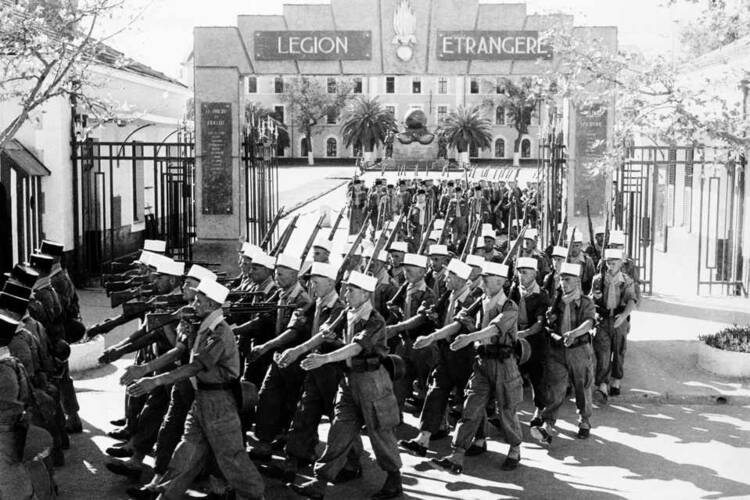The French Foreign Legion: the colonial force par excellence
What drives a man to fight and die for a country not his own? Jean-Vincent Blanchard takes up this question in his lyrical, detailed history of the French Foreign Legion. His book chronicles the military and political history of the organization in an effort to show how it helped shape the modern world. He depicts the lived experience of the legionnaire by drawing on their own written accounts and also explores the cultural mythology attached to this famous figure.
Formed in 1831, the French Foreign Legion was to become the colonial force par excellence. With a mandate to enlist only men from other nations, the Legion conducted perilous overseas missions without the jeopardy to political capital at home that the loss of a Frenchman could create. Blanchard follows its early campaigns in North Africa, Southeast Asia, and elsewhere up until the 1930s, recounting expeditions and battles that earned the Legion its fearsome reputation.
Blanchard rightfully situates the Legion within the shameful history of French colonialism. As he shows, the Legion was not only key in leading military conquests in new countries, but in laying the groundwork for later extraction of labor and resources. Capable fighters who also practiced many skilled trades, the Legion functioned as a corps of soldier-engineers, laying roads and posting telegraph wire as expeditions crisscrossed faraway lands.
The history also serves as a biography of Hubert Lyautey, a French general and colonial administrator who often commanded the Legion. Like the Legion itself, Lyautey cuts a complicated figure. Born into an aristocratic family and trained by Jesuits, Lyautey initially enlisted hoping that the traditions of the French Army could help stabilize a country strained between monarchists and republicans, the church and the secular republic, the elite and the masses.
The Legion was not only key in leading military conquests in new countries, but in laying the groundwork for later extraction of labor and resources.
Blanchard is fascinated by the intrepid Lyautey. Campaigns took the general from Algeria to Vietnam, Madagascar to Morocco. He was a star in French cultural circles but always longed to be abroad with his characteristic “taste for adventure and the exotic.” Like many legionnaires, Lyautey professed profound admiration for the lands and peoples whose subjugation he dutifully carried out.
Beyond the legionnaires themselves, Blanchard offers brief portraits of iconic men and women who crossed paths with the corps, like the enigmatic Isabelle Eberhardt and Blessed Charles de Foucauld. Blanchard’s de Foucauld is a compelling, holy man who tended to the needs of the otherwise “spiritually dispossessed” legionnaires but was also implicated in the ills of colonization.
Other passages delve into the cultural mythology surrounding the legionnaire as promoted by popular songs, novels and films. The archetype is familiar: A social outcast with a troubled past and a dark temperament is lured to exotic landscapes, where he survives the harshest conditions, engages in courageous combat, overcomes his fear of death, and ultimately proves loyal to France and even more loyal to his brothers in the Legion. Blanchard tries to unravel the extent to which this image was partly truthful and partly contrived, but does not always succeed in clarifying the matter.
Integral to the legionnaire’s mystique, in any case, is his melancholy, a pervasive malady that the afflicted nicknamed le cafard (“the cockroach”). In an organization known for harboring criminals and fugitives, alcoholics and malcontents, prolonged periods of hardship and isolation drove countless soldiers to bouts of drinking and brawling, as well as waves of desertion and suicide. The legionnaire, Blanchard confirms through firsthand accounts, was often as “moody, marginal, and uncompromising” as popular tales had him.
Blanchard’s achievement is to bring to light the historical paradox of the legionnaire.
Blanchard’s achievement is to bring to light the historical paradox of the legionnaire: With the impersonal forces of modernization pressing in on him, seeing no future his own amid industrialization and bureaucratization of society, the legionnaire finds his escape from European conformity by testing himself in brutal colonial warfare. The disenchanted legionnaire is himself a byproduct of the contradictions and failures of European modernization, yet he brazenly risks his life abroad to spread that same project of modernity.
The book’s main weakness is that it is not always clear where the author stands on his subject. Yes, the Legion was a colonial force responsible for historical atrocities, Blanchard concludes, but he approvingly suggests that legionnaires were also men who set standards of heroism, masculinity and camaraderie for generations. At times the author writes with a worrying ambivalence, adopting the romantic language of adventure and glory that a more careful approach would avoid or place in context.
Today, parsing the dark currents of history leading to the world wars, we can better understand the dilemma of those grim legionnaires who felt they had nowhere to turn in a world to which they no longer belonged. But we cannot endorse their legend, steeped as it is in blood.
This article also appeared in print, under the headline “The French Foreign Legion: the colonial force par excellence,” in the October 16, 2017, issue.










